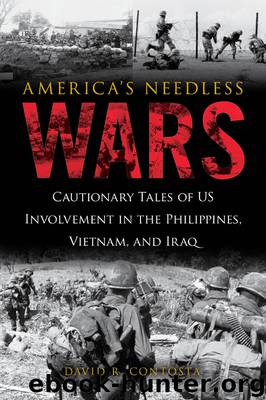America's Needless Wars by David R. Contosta

Author:David R. Contosta
Language: eng
Format: epub
ISBN: 9781633882904
Publisher: Prometheus Books
Published: 2017-02-22T05:00:00+00:00
“I speak as a child of God and brother to the suffering poor of Vietnam. I speak for those whose land is being laid waste, whose homes are being destroyed, whose culture is being subverted.”
—Martin Luther King Jr.
In May 1968, President Johnson succeeded in starting peace talks, to be held in Paris. But the talks made no real progress before Johnson left office, and they would not result in a peace agreement until January 1973, nearly five years later, in what must be seen as an American defeat. During the time the talks were taking place, tens of thousands more people, both American and Vietnamese, would be killed and maimed. Revelations of American atrocities in Vietnam would further undermine support for the war in the United States and badly tarnish the nation's claims to moral exceptionalism. As if that were not enough, the Nixon administration's criminal behavior in response to critics of the war and to other perceived enemies of the administration would force President Nixon to resign from office and would leave the American people a lasting legacy of mistrust of government.
Taking advantage of Johnson's vulnerability on Vietnam was Robert Kennedy, the brother of the slain President John F. Kennedy. Just two weeks before Johnson's announcement that he would not seek reelection, Kennedy had entered the race for the Democratic nomination. He had become an outspoken critic of the Vietnam War and promised that, if elected, he would end American participation in that conflict. Also seeking the Democratic nomination was Vice President Hubert Humphrey, who was handicapped by his association with what many had come to call “Johnson's war.” In contrast, Kennedy seemed to be well on his way to becoming the Democratic nominee following his victory in the California primary held on June 4. However, late that night, Kennedy was shot and killed at the Ambassador Hotel in Los Angeles as he was making his way through the hotel's kitchen en route to a press conference elsewhere in the building. With Kennedy dead, Humphrey was a cinch for the nomination.
The Democrats’ convention, held in Chicago in late August, turned out to be a disaster for the party. Outside the convention hall, Chicago police, assisted by the Illinois National Guard, attacked protesters, resulting in what many called a police riot. The violent melee was televised live, nationwide, with the result that many viewers, through guilt by association, blamed the Democrats for the rioters. The violence outside the convention floor also gave a perfect campaign theme for the Republican nominee, Richard Nixon, who promised to restore law and order in the country. Realizing the great unpopularity of the war, Nixon said he had a “secret plan” for ending it. Although leading Humphrey in the early polls, Nixon's numbers began to slip after Humphrey distanced himself from Johnson and the war. Some analysts believed if the campaign had lasted another ten days or so, Humphrey would have won. As it turned out, Nixon garnered 43.42 percent of the popular vote to Humphrey's 42.
Download
This site does not store any files on its server. We only index and link to content provided by other sites. Please contact the content providers to delete copyright contents if any and email us, we'll remove relevant links or contents immediately.
| Africa | Americas |
| Arctic & Antarctica | Asia |
| Australia & Oceania | Europe |
| Middle East | Russia |
| United States | World |
| Ancient Civilizations | Military |
| Historical Study & Educational Resources |
The Radium Girls by Kate Moore(12028)
100 Deadly Skills by Clint Emerson(4925)
Rise and Kill First by Ronen Bergman(4789)
The Templars by Dan Jones(4689)
The Doomsday Machine by Daniel Ellsberg(4490)
The Rape of Nanking by Iris Chang(4213)
Killing England by Bill O'Reilly(4001)
Stalin by Stephen Kotkin(3966)
Hitler in Los Angeles by Steven J. Ross(3946)
12 Strong by Doug Stanton(3550)
Hitler's Monsters by Eric Kurlander(3343)
Blood and Sand by Alex Von Tunzelmann(3205)
The Code Book by Simon Singh(3189)
Darkest Hour by Anthony McCarten(3133)
The Art of War Visualized by Jessica Hagy(3007)
Hitler's Flying Saucers: A Guide to German Flying Discs of the Second World War by Stevens Henry(2754)
Babylon's Ark by Lawrence Anthony(2679)
The Second World Wars by Victor Davis Hanson(2526)
Tobruk by Peter Fitzsimons(2518)
